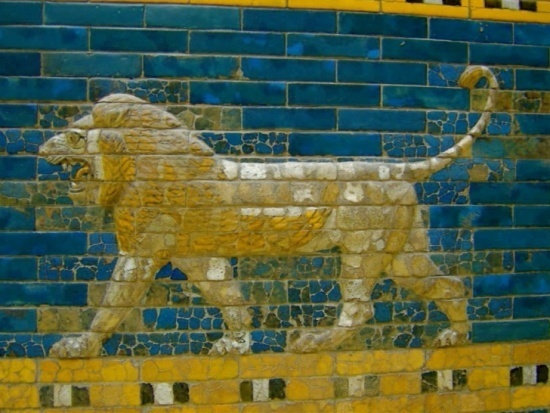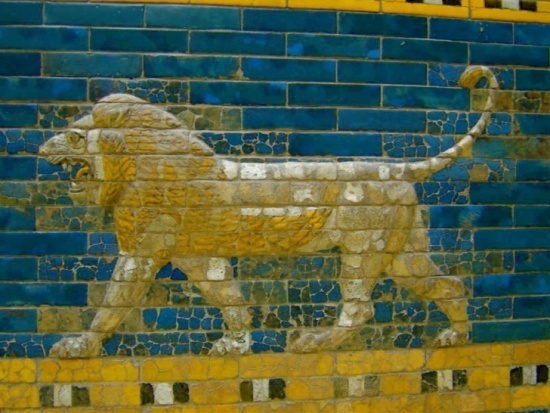"Through Love Serve One Another" -- Galatians 5:7-15
 Sunday, June 4, 2017 at 03:19PM
Sunday, June 4, 2017 at 03:19PM 
Here's the audio from this morning's sermon: Click Here
Living in Light of Two Ages
____________________________
 Sunday, June 4, 2017 at 03:19PM
Sunday, June 4, 2017 at 03:19PM 
Here's the audio from this morning's sermon: Click Here
 Sunday, June 4, 2017 at 03:14PM
Sunday, June 4, 2017 at 03:14PM  The Search for a New Adam
The Search for a New Adam
In many ways the Bible is the unpacking of God’s initial promise recorded in Genesis 3:15, that though death entered the world through man’s fall, one day a child would be born who would restore all things and crush the serpent’s head. Therefore, the primary question that we should ask as we make our way through the pages of Scripture is whether any new character that emerges might actually be this child of promise. What we see again and again, however, is that all of these potential messiahs end up not being anything new at all, but actually end up being mirror images of the old Adam.
 Wednesday, May 31, 2017 at 01:21PM
Wednesday, May 31, 2017 at 01:21PM  Senator Ben Sasse has made a number of media appearances promoting his recent and excellent book, The Vanishing American Adult. But whenever Ben gets the chance, he reminds his audience (especially on his twitter feed--which is a must follow) that one reason behind a number of the problems facing modern America is a lack of education in basic civics.
Senator Ben Sasse has made a number of media appearances promoting his recent and excellent book, The Vanishing American Adult. But whenever Ben gets the chance, he reminds his audience (especially on his twitter feed--which is a must follow) that one reason behind a number of the problems facing modern America is a lack of education in basic civics.
In light of Ben's media appearances and our recent Academy course on Allen Guezlo's American Mind (The American Mind), a number of people have asked me where to turn for a better understanding of the U.S. Constitution and the history of its ratification. Here are a couple of suggestions.
Start with the U.S. Constitution Reader which was put together by the Political Science department of Hillsdale College. You can find it here: Constitution Reader
I would also recommend The Constitution: An Introduction. Written by Michael and Luke Paulsen, this volume provides a basic commentary on the history of Constitution and an informative survey of how the constitution frames so much of American life. Not scholarly, but informative.
If you prefer audio/video, well then you can do no better than Dr. Guelzo's new offering from the Teaching Company, Americas Founding Fathers. Guelzo is a great historian and a brilliant story teller--telling the story of the ratification of the U.S. Constitution as a fascinating series of debates and compromises among the rather colorful participants. You ought to purchase this when on sale (it often is). My wife and I listened to much of the series while commuting to and from Escondido during my recent teaching stint at Westminster Seminary California. Listening to this made the commute bearable (well almost).
Thanks Senator Sasse for reminding us of how quickly we can lose our basic freedoms if we do not know how and why a republican government providing ordered liberty came into being and what it means for us as a citizens during a time of eroding freedom.
 Wednesday, May 31, 2017 at 11:45AM
Wednesday, May 31, 2017 at 11:45AM 
The Tenth in a Series of Sermons on the Book of Daniel
Nebuchadnezzar foresaw this terrible night in a dream–a great empire, crumbing by the day, now entering its final hours. In his visionary dream of a gigantic metallic statue with a head of gold, Nebuchadnezzar saw the greatness of his own empire, even as Daniel warned him that both the king and his empire would come to an end–crushed by a rock cut from a mountain without human hands. Now, Nebuchadnezzar is long since dead and gone with the last of the Babylonian kings (Belshazzar, co-regent with his father–Nabonidus) on the throne. The year is 539 BC. Although Daniel does not reveal the circumstances behind the debauchery seen in the opening verses of chapter 5 until the closing verses of the chapter, this is the Kingdom of Babylon’s last night. Persian armies are about to take Babylon through a daring commando raid using the city’s dried-up water supply. Instead of leading the city’s defenders in an effort to save the city, Belshazzar hosts a huge drunken party as though all were right with the world. On this night, the last hours of the great Babylonian empire, Belshazzar spends it drinking and mocking YHWH, even as YHWH takes his kingdom from him and gives it to another–the Persian conqueror of the city, Darius the Mede. All of this was foretold in king Nebuchadnezzar’s dream of Daniel 2.
We resume our series on the Book of Daniel picking up in Daniel 5, where the circumstances are greatly different from those at the end of Daniel 4 (v. 37), when Nebuchadnezzar confessed–even if reluctantly–“Now I, Nebuchadnezzar, praise and extol and honor the King of heaven, for all his works are right and his ways are just; and those who walk in pride he is able to humble.” Nebuchadnezzar died in 562 BC–23 years before the events of recounted here. A list of short-term successors had taken Nebuchadnezzar’s place. The first was the king’s own son, Amel-Marduk, who was assassinated by his brother-in-law in 560 (reigning just two years). One of those who plotted his death (Neriglessar) ruled unto 556, and was succeeded by his own son, Labashi-Marduk, who was brought down just a few months into his reign by a coup lead by Nabonidus, an unpopular eccentric known for his devotion to the god “Sin” instead of the traditional and most favored Babylonian god, Marduk (Bel).
Nabonidus was hated by the people, so for some ten years he ruled from the Arabian wilderness over the rapidly declining, increasingly decadent, and about to be defeated Babylonian empire–appointing his son Belshazzar as a co-regent representing the “pro-Marduk” wing of the Babylonian court. It fell to Belshazzar to remain in Babylon when the Persians finally breached the city’s walls (after damming-up the Euphrates river so that an elite unit could enter the walled city using the dried up riverbed which ran through the heart of the city). After the fall of Babylon (his capital), the cowardly Nabonidus later surrendered to the Persian king Cyrus and lived out his life in exile. Darius the Mede and Cyrus are likely one and the same man–Darius the Mede is the conquering king’s birth name, while Cyrus is thought to be his Persian royal throne name.
The scene in Daniel 5 is one in which the city’s fate has already been determined–it is just a matter of time before the Persians open the gates from the inside so that the Persian army can enter the undamaged city in triumph. We can even precisely date the events of this night to October 11, 539, because Persian military records tell us that Darius’ victorious armies marched into Babylon on 16 Tishri, 539 (October 12). According to verse 30, the king’s banquet occurred the very night the city fell to Darius.
To read the rest of this sermon: Click Here
 Monday, May 29, 2017 at 10:27AM
Monday, May 29, 2017 at 10:27AM Sunday Morning, June 4: We continue our series on Galatians. We will consider Paul's exhortation to use our Christian liberty to serve our brothers and sisters in love. Our worship service begins at 10:30 a.m.
Sunday Afternoon: What is repentance? The Heidelberg Catechism deals with this question in Lord's Day 33 (Q & A 89-91). Our catechism service begins @ 1:15 p.m.
Wednesday Night Bible Study, May 31, (7:30 p.m.): We follow-up our series on personal evangelism by considering the accuracy of the New Testament text.
The Academy: Resumes in the Fall of 2017.
For more information on Christ Reformed Church you can always find us here (Christ Reformed Info), or on Facebook (Christ Reformed on Facebook).
 Sunday, May 28, 2017 at 03:48PM
Sunday, May 28, 2017 at 03:48PM 
Here's the audio from this morning's sermon: Click Here
 Sunday, May 28, 2017 at 03:41PM
Sunday, May 28, 2017 at 03:41PM  Lifelong Learners
Lifelong Learners
When Jesus gave the Great Commission, he didn’t tell his disciples to go into all the world in order to induce authentic worship experiences with the proper use of stage lighting, fog machines, and powerful sound systems. He also didn’t encourage his followers merely to make one-time converts, but rather he said, “Go and make disciples of all nations.” (Mt 28:19). On this program, as we’re concluding our series on Creed or Chaos, the hosts will be taking a look at the church’s role in making lifelong disciples of Jesus Christ.
 Wednesday, May 24, 2017 at 10:11AM
Wednesday, May 24, 2017 at 10:11AM 
The Ninth in a Series of Sermons on the Book of Daniel
King Nebuchadnezzar has had a second terrifying dream. Once again his court magicians and wise men cannot interpret his dream. Greatly troubled, the Babylonian king summons his Hebrew servant Daniel to interpret this dream which has disrupted the king’s life of relative ease and comfort. Daniel will reveal that the unsettling circumstances foretold in Nebuchadnezzar’s previous dream are soon to come to pass. In the prior dream (as recounted in Daniel 2), the king saw a frightening metallic stature with a head of gold, which represented the king and his empire. But that kingdom will fall before a series of empires yet to follow. Nebuchadnezzar and his vast kingdom will come to an end–replaced by the Persian empire then just beginning to rise to power. Although Nebuchadnezzar remains convinced that his kingdom is mighty and that it stands as a testimony to his own accomplishments and greatness, as a consequence of these two dreams, the king is beginning to realize that his kingdom is no match for YHWH’s. YHWH rules all the kingdoms of the earth from heaven. His kingdom is not of this world. His kingdom is eternal. None of this can be said of any earthly kingdom, including Nebuchadnezzar’s.
As we continue our series on the Book of Daniel we pick-up where we left off last time (v. 19 of Daniel 4) when the king had another troubling dream and then summoned the Hebrew prophet (Daniel) to interpret the dream for him. Ironically, it was Daniel (a believing Jew), who, in gaining favor with the king after interpreting his first dream successfully was appointed prefect over Nebuchadnezzar’s pagan court magicians. The king’s magicians fail again and so it falls to Daniel to explain to the king what his second dream foretold–events which Nebuchadnezzar probably suspected (based upon his previous terrifying dream years before), yet which now brought him to a breaking point.
As we saw last time, ideally this passage (Daniel 4–Nebuchadnezzar’s last appearance in the Book of Daniel) is best treated in one sermon, but the tyranny of time does not allow us to cover the passage in enough detail in one sermon to fully unpack its contents. Since this is a “part two” sermon in a sense, I’ll briefly recap the ground we covered last time, before we turn to our text–the balance of Daniel 4.
The scene described in Daniel 4 comes late in Nebuchadnezzar’s life and forty-plus year career, likely at some point after his prolonged military campaigns in Judah and Tyre, yet before his final campaign in Egypt and his death in 562 BC. Chapter 4 contains a first-person account from the king (in the form of a letter) about his dream, his subsequent break with reality, followed by his equally dramatic restoration. The king has witnessed YHWH’s power and sovereign hand often enough to willingly confess that YHWH is the Most High God (v. 1), who is all powerful (v. 35), and whose kingdom will never end (vv. 3, 34). Yet Nebuchadnezzar never confesses his sins nor repents of them (or even acknowledges that he is a sinner). He never rejects the pagan gods of Babylon, even though he is forced to acknowledge that Daniel’s God (YHWH) is much more powerful than Bel (Marduk), the king’s preferred god from among the legion of Babylonian deities. We see in this chapter that Nebuchadnezzar has reached the pinnacle of his career, has another frightening dream, suffers a mental collapse (as foretold in the dream), and then has his sanity restored. All of this is YHWH’s doing.
To read the rest of this sermon, Click Here
 Monday, May 22, 2017 at 10:28AM
Monday, May 22, 2017 at 10:28AM  Sunday Morning, May 28: We return to our series on Galatians. We will take up Paul's discussion of Christian liberty in Galatians 5:1-6. Our worship service begins at 10:30 a.m.
Sunday Morning, May 28: We return to our series on Galatians. We will take up Paul's discussion of Christian liberty in Galatians 5:1-6. Our worship service begins at 10:30 a.m.
Sunday Afternoon: Why should we do good works? We will discuss the Heidelberg Catechism's answer to this question (Lord's Day 32 (Q & A 86-87). Our catechism service begins @ 1:15 p.m.
Wednesday Night Bible Study, May 24, (7:30 p.m.): We follow-up our series on personal evangelism by discussing evidence for the resurrection of Jesus.
The Academy: Resumes in the Fall of 2017.
For more information on Christ Reformed Church you can always find us here (Christ Reformed Info), or on Facebook (Christ Reformed on Facebook).
 Sunday, May 21, 2017 at 02:04PM
Sunday, May 21, 2017 at 02:04PM 
Here' Rev. Lenzner's Morning Sermon on Psalm 130:1-9: Click Here